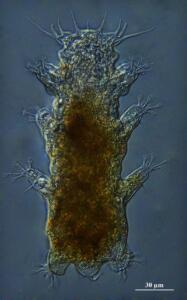In the sun-soaked waters off the southeastern coast of Tamil Nadu, researchers from the Cochin University of Science and Technology have made a minuscule discovery with a monumental tribute. A newly identified species of marine tardigrade has been named in honour of the late former President and celebrated scientist, Dr. A.P.J. Abdul Kalam.

These water-dwelling creatures, more charmingly known as ‘water bears’, might be measured in mere micrometres, but they hold a vast reputation for their remarkable resilience. While they may be almost invisible to the naked eye, their hardiness is of legendary proportions.
This specific species, christened as Batillipes kalami, was discovered in Mandapam and belongs to the genus Batillipes. The recent unveiling of this discovery in the Zootaxa journal was a collaborative effort of Vishnudattan N.K., S. Bijoy Nandan from Cusat, and Marcus Rubal from the University of Minho, Portugal.
“Batillipes kalami is the pioneering taxonomically described species of the Batillipes genus from India,” remarked Dr. Nandan. It’s not just the first from the eastern shores but also the second marine tardigrade to have been unearthed from Indian waters. A previous discovery was made in Kerala’s Vadakara in 2021.
These water bears are not just tough; they’re intricate. The Batillipes kalami averages a length of 0.17 mm and boasts a trapezoid-shaped head, from which filament-like cirri protrude. Moreover, the subtle variations between the genders caught the researchers’ attention. “The females typically present slightly larger dimensions than their male counterparts,” explained Mr. Vishnudattan.
Around 60 specimens were meticulously collected from Mandapam’s intertidal regions. This initiative aims to cast a broader net over the largely uncharted marine tardigrade biodiversity of the Indian subcontinent. Given the nascent stage of marine tardigrade studies in Indian waters, the team’s finding is a crucial step towards better understanding.
The homage to Dr. Kalam wasn’t just an academic decision; it was deeply personal. The site of discovery is in proximity to his hometown, Rameswaram. It serves as a nod to his unwavering dedication to science and technology.
Of note, Batillipes kalami is the 37th member of its genus, Batillipes. Despite its global distribution, most prior research has focused on European waters. Earlier claims of species in Indian waters remain unverified due to insufficient taxonomic details.
The Zootaxa paper underscores a crucial message: the Indian coasts remain an underexplored frontier for marine tardigrade biodiversity. And as researchers unravel these microscopic mysteries, the tribute to a giant of Indian science becomes ever more poignant.
